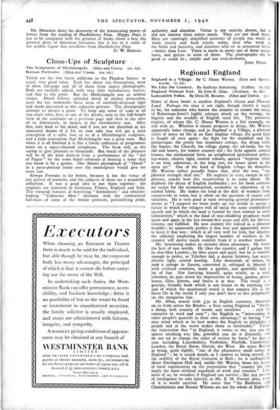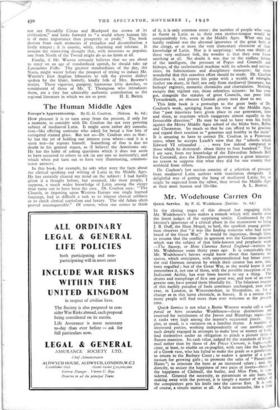Regional England
England is a Village. By C. Henry Warren. (Eyre and Spottis- woode. 7s.6d.) NONE of these books is another England's Green and Pleasant Land. Perhaps the time is not right, though clearly it ought to be, for someone who knows the country to restate the terms of Robertson-Scott's highly salutary attack on the wrongs, the bigotry and the muddle of English rural life. The preserva- tionists, of whom Mr. C. Henry Warren is a fair example, are still with us. Whether it means progress or decay, Mr. Warren apparently hates change, and in England is a Village, a pleasant series of notes on life in an East Anglian village, the good fight is fought all over again : the fight for the muddled and the picturesque, the pretty but insanitary cottage, the dying craft, the Squire, the Church, the village pump, the oil-lamp, for the old and hearty, for honest country toil ; the fight against council houses, the mechanised farm, an enlightened agricultural policy, tap-water, electric light, central schools, against " hygiene (that) is no wise substitute, in the long run, for hours spent in the open air." Out of the kind of English village he describes Mr. Warren rather proudly hopes that, after the war, " our phoenix strength shall rise." He neglects to state, except in airy phrases, exactly how this resurrection is to come about. He deplores the decay of English husbandry ; yet his book contains no recipe for the reconstruction, economic or otherwise, of its ruined fabric. He shakes his head at the drift of workers from countryside to town, but is silent on the question of causes and solutions. He is very good at such sweeping 'general pronounce- ments as " I suppose we must make up our minds to accept a future in which the villagers will all speak the same standardised speech and in which the land is farmed by men trained in town laboratories," which is the kind of tear-shedding prophecy made again and again in the last twenty-five years and still, for obvious reasons, not fulfilled. He sees country life indeed as a pleasant muddle ; he apparently prefers it that way and apparently wants to keep it that way : which is all very well for him, but whether the industry employing the largest number of workers in the country will derive much comfort from it is another matter. Mr. Armstrong makes no mistake about phoenixes. He wants the best of two worlds. He likes the country, and I gather that he also likes London ' • he likes peace and quiet, but he is sensible enough to prefer, as Tchehov did, a decent lavatory, hot water, electric light, central heating. Like thousands of others, he. took a cottage in Sussex, converted it, enlarged it, blessed it with civilised comforts, made a garden, and generally had a lot of fun. Not fancying himself, quite wisely, as a rural reformer, he puts down his impressions of house, garden, green- house, lilies, kittens, and leaves it at that. The ' he result is a gossipy, friendly book which is not meant to be anything else and of which the unashamed moral is that country life is the finest life in the world if only you don't have to live perpetually on the margarine line.
Mr. Allan, armed with £3o in English currency, descends on us from across the Border: a Scot seeing England as "fertile, a damp, lush country of woods and meadows . . -. rich for centuries- in wool and corn " ; the English as " intervening in other people's quarrels to their own advantage," as having " the easy mind which at its best makes the English so delightful a people and at the worst makes them so intolerable." Under the impression that " in England, it seems to me, you can do almost anything you like, provided you do it discreetly and do not try to change the order of society by force," he does a tour including Lincolnshire, Yorkshire, Norfolk, Cambridge, London, the Royal Show, Dorset, the West. He notes Boston as being, quite rightly, " one of the pleasantest small towns in England " ; he is struck dumb, as I confess to being myself, by the nobility of the Royal Crescent at Bath ; he is enthusiastic about Dartington Hall and, unlike Mr. Warren, bases his hopes of rural regeneration on the proposition that " country life can imply the Most civilised standards of work and creation." Like most of us, he wonders if England can survive ; like any person of intelligence he asks himself, as Mr. E. M. Forster does, what of it is worth survival. He notes that " the Baldwin and Chamberlains and Horace Wilsons are not the whole of England ;
nor are Piccadilly Circus and Blackpool the crown of its civilisation," and looks forward to " a world where human life is of more importance than prosperity or profit." The book derives from such moments of prejudice and dissatisfaction a lively temper ; it is caustic, witty, charming and tolerant. It arouses the interesting thought that, with invasions so popular, one from North of the Tweed might do us no harm at all.
Finally, if Mr. Warren seriously believes that we are about to enter on an age of standardised speech, he should take up Lancashire Folks. The greatest standardisers of the day, the Nazis, might waver before the prospect of trying to induce Mr. Warren's East Anglian labourers to talk the precise dialect spoken by the blunt, homely, kindly folk of Mrs. Broome's stories. These vigorous, pungent, humorous little sketches, so reminiscent of those of Mr. T. Thompson who introduces them, are a tiny but admirably authentic contribution to the
regional literature in which we are so poor. H. E. Bans.







































 Previous page
Previous page